Ohio After Roe
Chapter 3: “The Fight Here In Ohio Is Just Beginning”
By Amy Eddings & Stephanie Czekalinski
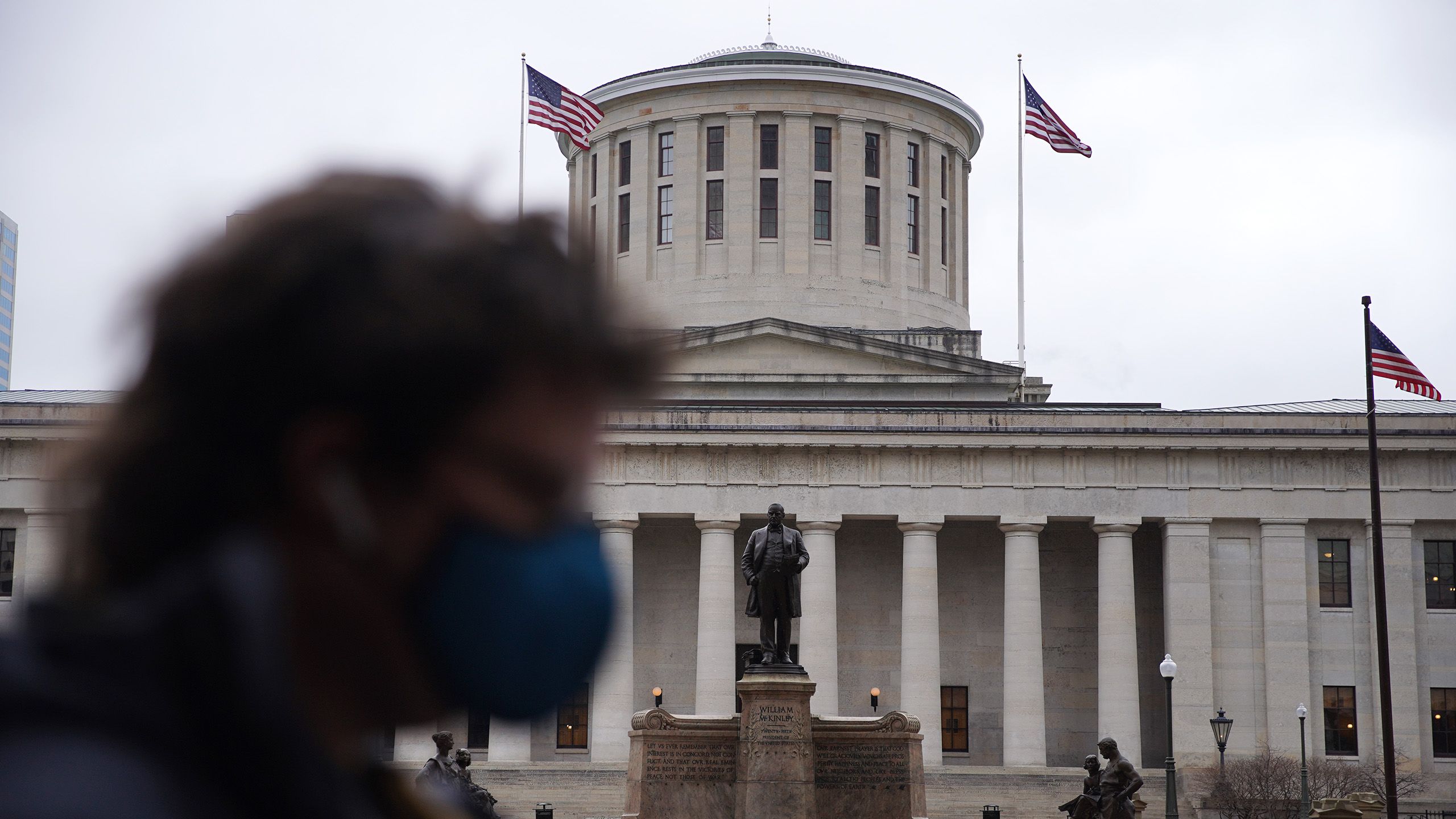
The U.S. Supreme Court’s decision to throw out Roe sent the issue of abortion access back to the states to regulate. Now, people on all sides of the abortion debate in Ohio are wondering what comes next.
“The shackles are no longer holding us back as state legislators!” Republican State Rep. Jena Powell of Arcanum told the crowd at the Ohio March for Life last October.
For three months, Ohioans glimpsed what would happen under a six-week legal limit on abortion. Many abortion opponents want even tougher restrictions, now that Roe is gone.
“The fight in Ohio is just beginning,” Powell continued. “Here in our state, we must pass a life-at-conception piece of legislation, and we need to do it quickly. We need to stop chemical abortions in our state, and we need to stop woke corporations from coercing employees across state lines and paying for their abortions,” Powell said, to applause and cheers.
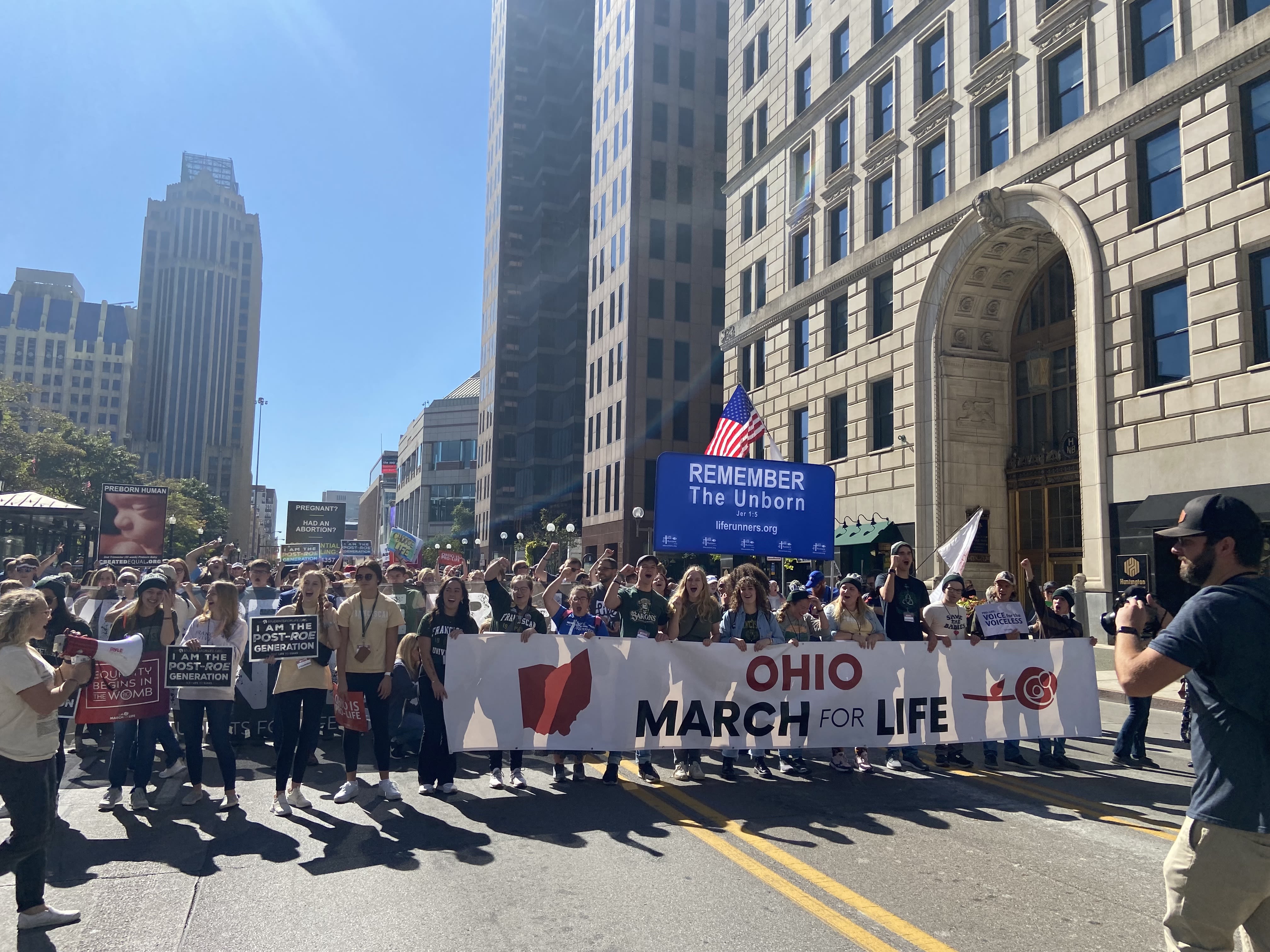
Demonstrators at the March for Life rally in Columbus on Oct. 5, 2022. [Jo Ingles / Statehouse News Bureau]
Demonstrators at the March for Life rally in Columbus on Oct. 5, 2022. [Jo Ingles / Statehouse News Bureau]
"There is now no excuse for abortion to be happening in our state, in other Republican states,” she added.
Powell also wants to empower citizens to sue people they believe helped someone get an illegal abortion. A bill she introduced last year, H.B. 480, was modeled after a similar law in Texas.
If that bill is reintroduced and becomes law, it could lead to lawsuits against abortion rights advocates like the Rev. Terry Williams of Chillicothe.
Outside his church on a warm early September afternoon, Williams stood in the parking lot next to his car, dressed in his pastor uniform: a high white collar, a buttoned-up black shirt, suit jacket and pants.
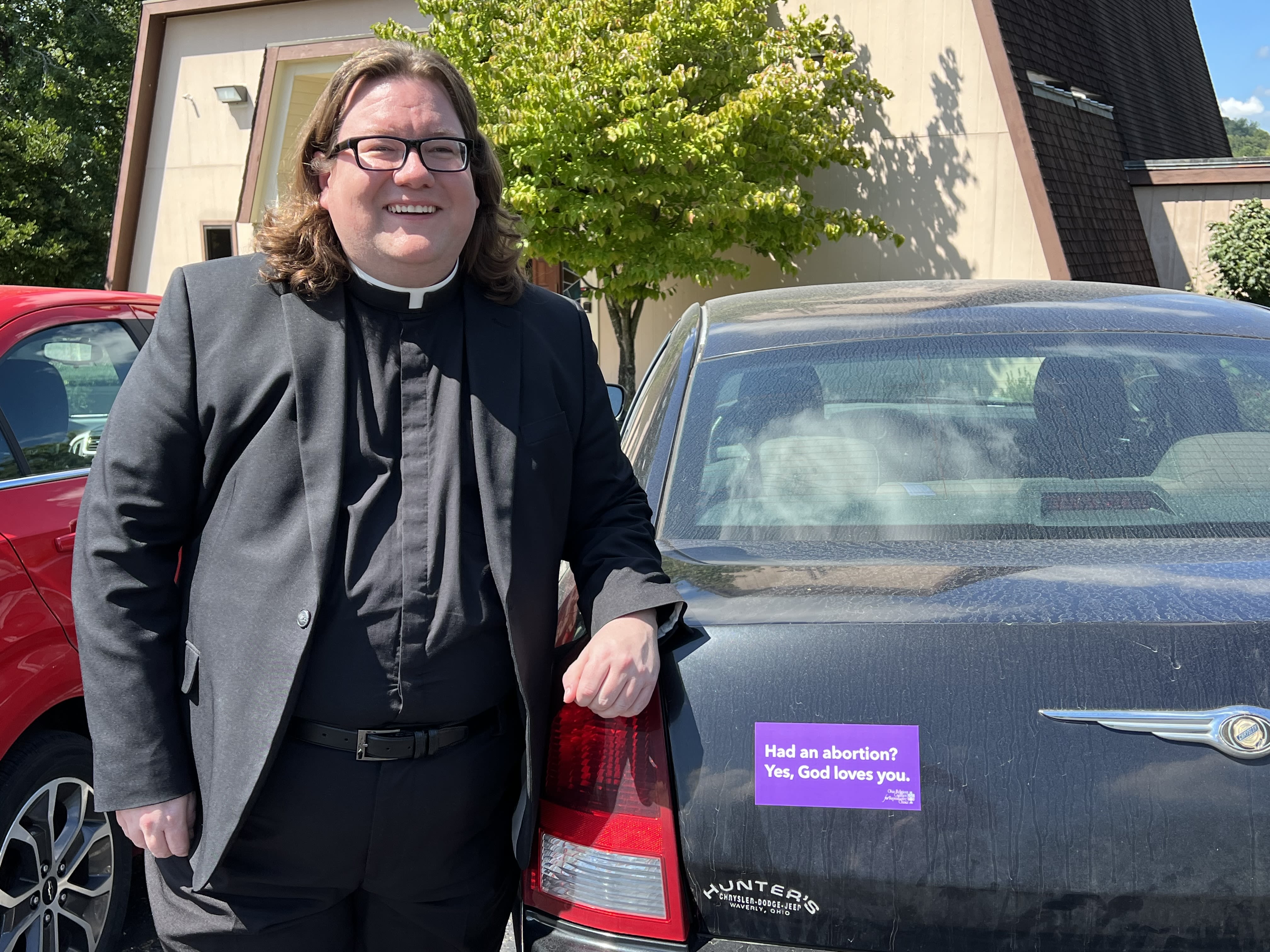
The Rev. Terry Williams, pastor of Orchard Hill United Church of Christ in Chillicothe, stands near the rear end of his car, where he’s placed a purple bumper sticker that reads, “Had an abortion? Yes, God loves you.” Williams said he has had to replace the bumper sticker several times because it gets torn off. [Amy Eddings / Ideastream Public Media]
The Rev. Terry Williams, pastor of Orchard Hill United Church of Christ in Chillicothe, stands near the rear end of his car, where he’s placed a purple bumper sticker that reads, “Had an abortion? Yes, God loves you.” Williams said he has had to replace the bumper sticker several times because it gets torn off. [Amy Eddings / Ideastream Public Media]
“It’s a 2006 dark black Chrysler 300 series that has about 158,000 miles on it and will get more miles on it over the next few months, unfortunately, driving folk all over the place for abortion care,” he said.
His car has a purple bumper sticker that says, “Had an abortion? Yes, God loves you.”
“Abortions are holy,” he said. “Abortions are life-giving. Abortions are at the root of what it means to have autonomy and choice over your body.”
Abortions are hard to get in this part of Ohio. The nearest clinics are at least 50 miles away. Williams said some women in Appalachia choose to handle their own abortions. He lets them know how they can do so using medications available from abortion providers or through the mail.
“This is what we hope people can hear out of all of this work, is that you do not have to have an unsafe self-managed abortion,” he said. “The days of coat hangers should be over.”
Williams is a member of Faith Choice Ohio, a coalition of religious leaders and faith communities that supports reproductive rights. It trains people how to talk to others about self-managed abortion in a manner that reduces the risk of legal trouble.
“We want to make sure that it's not coming across as, we are directing individuals,” said Williams. “We've already seen in places like Texas, people are coming up with all kinds of laws to criminalize the way folks can share information about self-managed abortion.”
Waiting for the “first case”

Williams is not the only one bracing for increased regulations and criminal penalties.
So are doctors, abortion providers, reproductive rights groups and lawyers.
In July, several attended a symposium in Cleveland one month after the Supreme Court struck down Roe and Ohio’s Heartbeat Law went into effect.
“Everyone, welcome to the Cleveland Metropolitan Bar Association,” said Ian Friedman, a criminal defense attorney, who organized the event. “Our subject, for which you are all here, is the legal and medical landscape of reproductive rights in Ohio after the United States Supreme Court case recently.”
The uncertainty in the room was palpable as attendees raised question after question:
“Is giving money to an abortion fund or a defense fund complicity?”
“If a patient were to order a Lyft or an Uber to go to an appointment, is that Uber driver … do they have a shared intent?”
“What about frontline staff, receptionists, medical records workers, anyone who touches records, should they have concern for potential prosecution?”
Many of the answers were speculative because Ohio’s Heartbeat Law and other states’ abortion laws were so new.
One of the panelists, Cuyahoga County Assistant Prosecutor Jennifer Driscoll, said the guessing won’t end until someone presses charges.
“I think it's when the first case is filed, when the first prosecution is out there and to see what people are going to try to do with the laws and what will stick and what won't stick,” Driscoll said.
Under Ohio’s Heartbeat Law, doctors who perform abortions after the six-week legal limit face fifth-degree felony charges, unless they can prove the procedure was necessary to prevent the death or the severe impairment of the mother. If convicted, doctors could spend six to 12 months in prison, lose their medical license and pay civil damages equal to $10,000 and a state medical board penalty of up to $20,000.
Friedman said he is developing a network of attorneys willing to represent the defendant in that first case.
“I've spoken to my colleagues on the other side of the aisle, some of my prosecutor friends that I respect,” he said. “And they have made it clear that there are those among them that are chomping at the bit to bring one of these cases. So the certainty is it's coming. The uncertainty is where and how.”
A “culture change” in the abortion rights movement
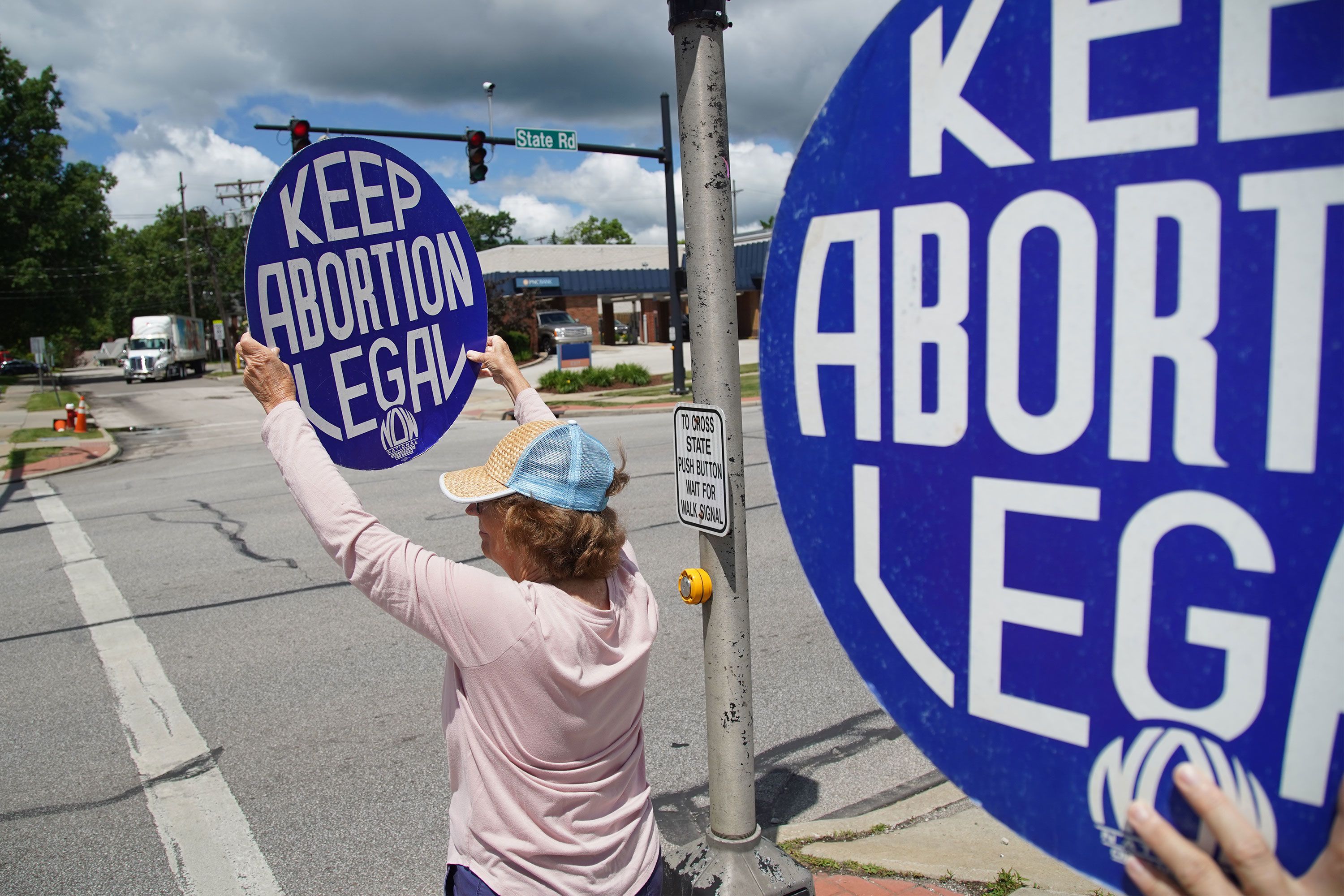
Waiting, and reacting.
It’s a familiar position for abortion rights advocates in Ohio. Some acknowledge they’ve been playing defense for years, pushing back against each new abortion restriction.
The ACLU of Ohio is currently challenging six state laws, including the 2019 Heartbeat Law, in state and federal courts.
Outside of litigation, supporters of abortion rights appeared divided when they talked about next steps during a meeting at Trinity Cathedral Episcopal Church in Cleveland in late July. The roundtable discussion was convened by Ohio’s Democratic U.S. senator, Sherrod Brown.
Brown was there to listen, he told attendees.
“I only will say that, thank you for already speaking out,” he said.
Some at the roundtable said the fight for abortion rights must be part of a broader effort to expand access to reproductive health care.
Alana Belle, then the former deputy director of the Ohio Women’s Alliance, a reproductive justice group, said the focus should be on those who are poor, Black or transgender.
“When we're talking about abortion access, I think one of the strongest things that we can do is sort of shift the conversation to say, from women's rights to human rights to people's rights, to our rights,” Belle said.
Others asked the senator about the political appetite for major changes in the U.S. Senate and the Supreme Court:
“Is there a potential to overturn the filibuster? You know, can we get federal action?” asked one participant.
“Is there any movement on adding additional justices to the Supreme Court to balance what's going on here?” asked another, about the possibility of adding liberal justices to dilute the court’s conservative majority.
Pro-Choice Ohio’s Kellie Copeland urged Sen. Brown to secure passage of a bill that would protect a person’s right to end a pregnancy and a health care provider’s ability to offer abortions.
“We have to pass the Women's Health Protection Act,” Copeland said.
Brown said there weren’t enough people in the Senate and the U.S. House of Representatives who would vote for it.
Five days later, on July 15, the House passed the legislation, H.R. 8296, but it failed to advance in the Senate.
Dr. David Burkons, the doctor who runs the Northeast Ohio Women’s Center in Cuyahoga Falls was at the roundtable. The discussion was missing the point, he said.
“With all due respect to you people, things like women's rights and gay rights and all that, that's very, very important stuff. But it isn't abortion,” he said. “We have to get into the nitty gritty of how do we get women to be able to access abortion, and worry about all this other stuff at another time? And I'm sorry if that offends you.”
Burkons’ comments rankled others in the room.
“That this doesn't have relevance to the discussion is absolutely not true,” said Sri Thakkilapati, the interim executive director of Preterm, an abortion clinic in Cleveland. “The very fact that you did 10 abortions this morning is hinged on people doing this hard work of figuring out what does it mean to advance a movement and whose interests are represented in that movement.”
“But remember,” Burkons responded, “the other side has won.”
Abortion rights advocates say they need to build coalitions in order to succeed. They say they can do this work, and keep clinics open.
Burkons was not so sure.
“I mean, that's the problem to me with the whole movement. They talk in platitudes rather than what, today, to me, this meeting was about: How do we get women abortions?” he said.
Gerrymandering

Supporters of Ohio’s Heartbeat Law are frustrated that a Hamilton County judge has put it on hold while he hears arguments over its constitutionality. In the meantime, doctors can once again perform abortions much later in a pregnancy.
That judge is thwarting the will of Ohioans, said Katie Glenn, state policy director for Susan B. Anthony Pro-Life America, an anti-abortion political action group in Washington, D.C.
“The Heartbeat Law was something that was debated for many years in the legislature. The public was able to weigh in over and over,” Glenn said. “It passed through the legislative process. It was signed by the governor. And now one judge says, ‘Actually, I just don't think this is good policy.’ That is not the role of judges.”
Some observers of Ohio’s legislature wonder how much say voters actually have in shaping the state’s abortion policies.
Ohio is one of the most gerrymandered states in the nation, according to David Niven, an associate professor of political science at the University of Cincinnati, who studies gerrymandering. Gerrymandering is when the boundaries of election districts are drawn to favor one political party.
“You can't study campaigns in elections in Ohio for very long without realizing that what matters more than the candidates and often what matters more than the voters is the maps that they're living under,” said Niven.
Republicans have been in control of the redistricting process since 2001. They’ve drawn maps giving them supermajorities in the Ohio House and Senate. They expanded those supermajorities to historic proportions in last November’s elections.
This has happened even though voter preferences in statewide contests over the last decade have been more evenly split between Republicans and Democrats.
“If you add up all the bills that pass in the legislature of Ohio and compare that to the bills that are passing in other states’ legislatures, we have one of the most conservative legislatures in the nation. It's to the right of South Carolina.”
Niven’s research found state legislatures that were gerrymandered to heavily favor Republicans were 41 times more likely to impose strict abortion bans after Roe fell.
“The process is absolutely clear,” he said. “You get the abortion policies that your map allows.”
But Ohio Right to Life president Mike Gonidakis doesn’t think gerrymandering has anything to do with the success of anti-abortion legislation like the Heartbeat Law.
“Just because you're Republican doesn't mean you're pro-life. Just because you're Democrat doesn't mean you're pro-choice,” he said.
It took eight years to build support for the Heartbeat Bill, even among Republican lawmakers, Gonidakis said. The bill was introduced in 2011, making Ohio the first state to consider such a ban. Republican Gov. John Kasich vetoed it twice, saying it would never go into effect because of Roe.
Then came the 2018 gubernatorial race. Candidate Mike DeWine, a Republican, said he supported the bill.
There’s no gerrymandering in a statewide election for governor, said Gonidakis.
“Mike DeWine won,” Gonidakis said. “He said often on the campaign trail he would sign the Heartbeat Bill if he got elected. So it didn't stop the voters from voting for him.”
Voters backed DeWine again last year, reelecting him easily over an opponent who campaigned on abortion rights.

Jen Miller is the executive director of the League of Women Voters of Ohio. [Ryan Loew / Ideastream Public Media]
Jen Miller is the executive director of the League of Women Voters of Ohio. [Ryan Loew / Ideastream Public Media]
But there’s more to a gubernatorial election than the single issue of abortion, said Jen Miller, the executive director of the League of Women Voters of Ohio, a good-government group.
“Ohioans, when they cast their ballot for governor, they're thinking about a lot of things, not just abortion,” she said. “So pointing to one election, to say that that means the state of Ohio is pro-life, I think is highly problematic.”
Ohio’s legislature is more extreme in its positions on abortion than Ohio voters are, said Miller. A 2020 Baldwin Wallace University poll bears that out. It found 51% of likely voters thought abortion should be legal all or most of the time. Only 14% said abortion should never be legal.
The League of Women Voters has been fighting for fair maps in Ohio for decades. The nonpartisan group and others are currently locked in a battle with Republicans over their latest maps. They argue the maps are unconstitutional partisan gerrymanders. These maps gave Republicans an even bigger supermajority last fall.
The Ohio Supreme Court has so far sided with the League, rejecting the maps multiple times. But that could change. The court picks up the long-running case with a bench that became more conservative after last November’s elections.
Legislation like Ohio’s Heartbeat Law shows why redistricting matters, said Niven.
“I understand very well that gerrymandering sounds like geography as taught by accountants,” he said. “It sounds like something that's really dry and abstract and removed from people's lives. But the practical reality is, it's at the heart of every issue that folks care about.”
Living in a “heartbeat world”

Supporters of abortion rights know their cause has no chance in the current Ohio legislature.
They want a constitutional amendment guaranteeing the right to reproductive freedom. The earliest they could put it on the ballot is this November.
The amendment could not come soon enough for women with high-risk pregnancies that sometimes result in abortions, said Dr. David Hackney, a Cleveland obstetrician.
“We're seeing patients with fetal anomalies right now. We are seeing patients with concerning medical conditions right now and it never stops,” he said. “What's the accumulation of grief? What's the accumulation of moral injury over, you know, weeks and months or even a year?”
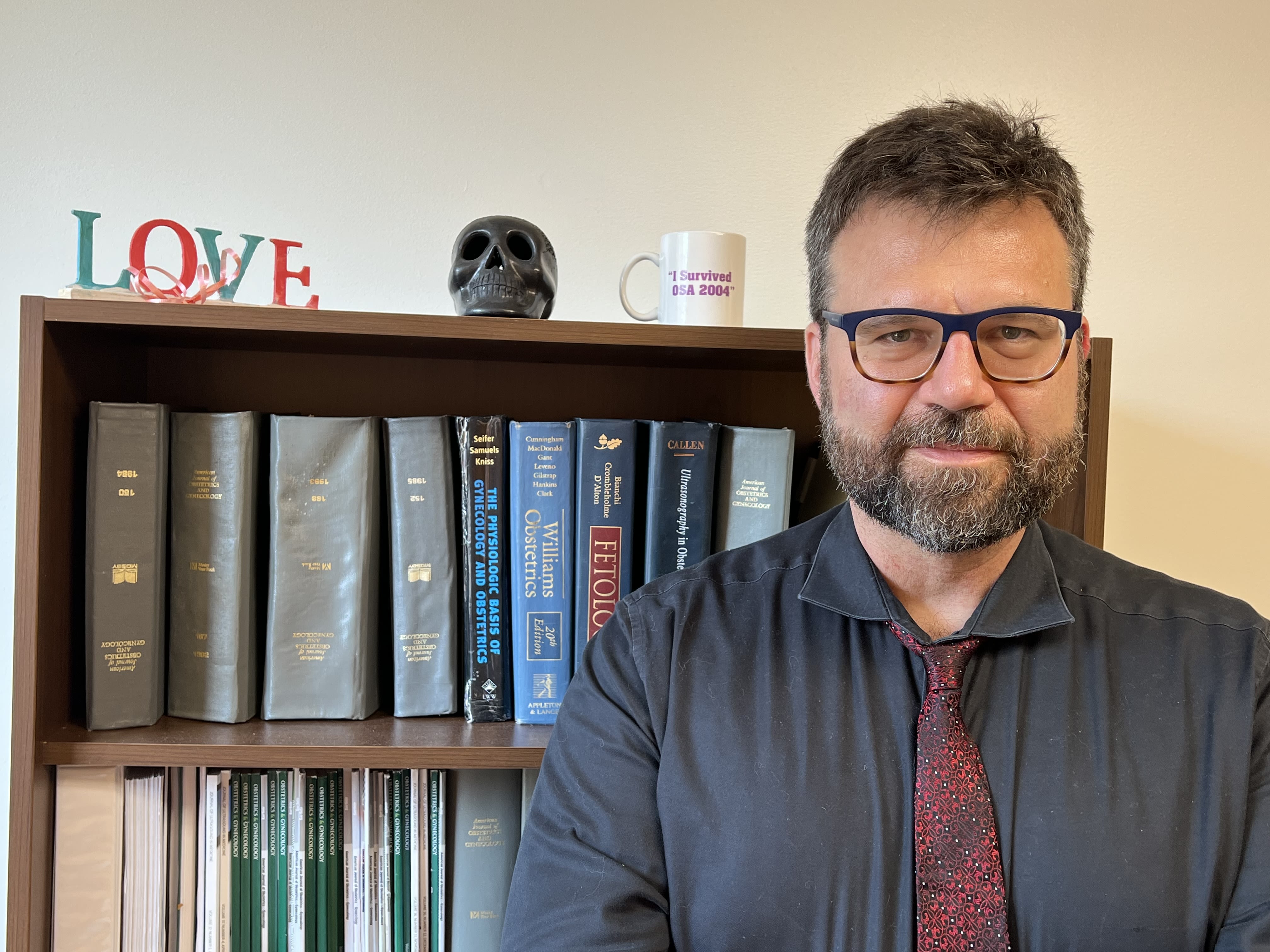
Dr. David Hackney is a Cleveland-area maternal-fetal medicine obstetrician who specializes in high-risk pregnancies. “I diagnose birth defects,” he said in a tweet last June expressing his concerns about the Heartbeat Law. Hackney also wrote an op-ed for The New York Times about his concerns for his patients, post-Roe. He is the Ohio Section Chair of the American College of Obstetricians & Gynecologists. [Amy Eddings / Ideastream Public Media]
Dr. David Hackney is a Cleveland-area maternal-fetal medicine obstetrician who specializes in high-risk pregnancies. “I diagnose birth defects,” he said in a tweet last June expressing his concerns about the Heartbeat Law. Hackney also wrote an op-ed for The New York Times about his concerns for his patients, post-Roe. He is the Ohio Section Chair of the American College of Obstetricians & Gynecologists. [Amy Eddings / Ideastream Public Media]
All-out bans or severe restrictions on abortion force some of his patients into impossible situations, Hackney said. He’s thinking specifically of deadly birth defects, like anencephaly, where there is no brain.
“When you have an anencephalic patient, and you cannot provide abortion services and they cannot travel out of state, it's just sad,” he said. “And there's nothing that you can do.”
Hackney is optimistic people will rethink abortion restrictions once they see the harm they can cause.
“The whole country could potentially be, ultimately, in a better place,” he said. “Five years down the road or 10 years down the road, maybe from a lived experience we'll gain an appreciation of the need for these rights and the complexities that arise when these rights are taken away.
But there will be suffering to get there, he said.
“Those lessons will be learned on the backs of women, and other pregnant patients who have suffered,” Hackney said.
When Dr. David Burkons looks ahead, he hopes the legal challenge to the Heartbeat Law is successful.
In the near term, though, he thinks about that first case in criminal court. He considers a lawyer’s advice to act as if everyone he encounters is wearing a wire.
“Eventually what you have to do is weigh the risk and decide whether it's worth continuing,” he said. “At this point, my feeling is, it's worth continuing. But if it ever gets to a point that I feel very threatened about it, say, ‘Hey, sorry, but I'm not spending my golden years in the pokey!’”
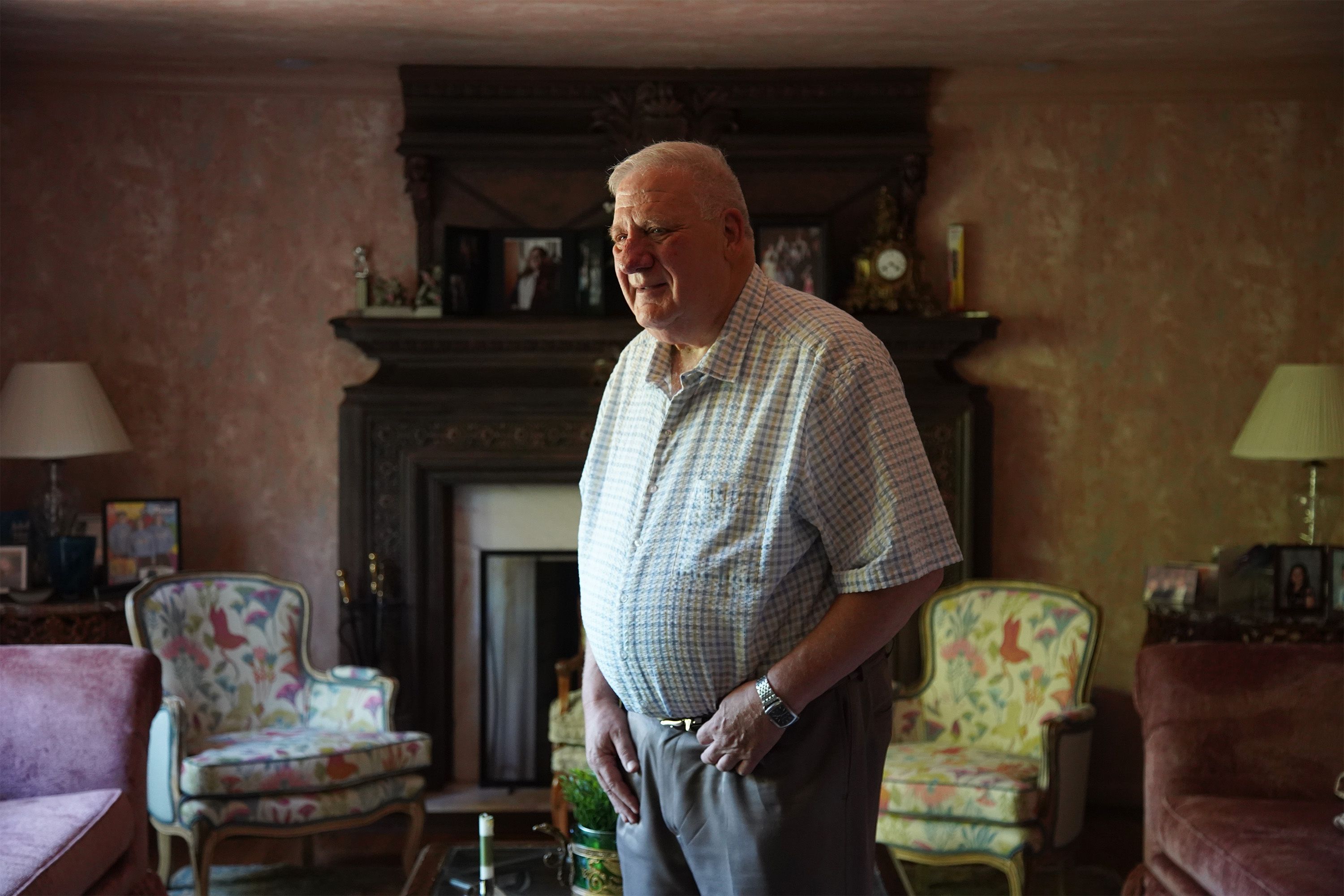
Photo by Ryan Loew / Ideastream Public Media
Photo by Ryan Loew / Ideastream Public Media
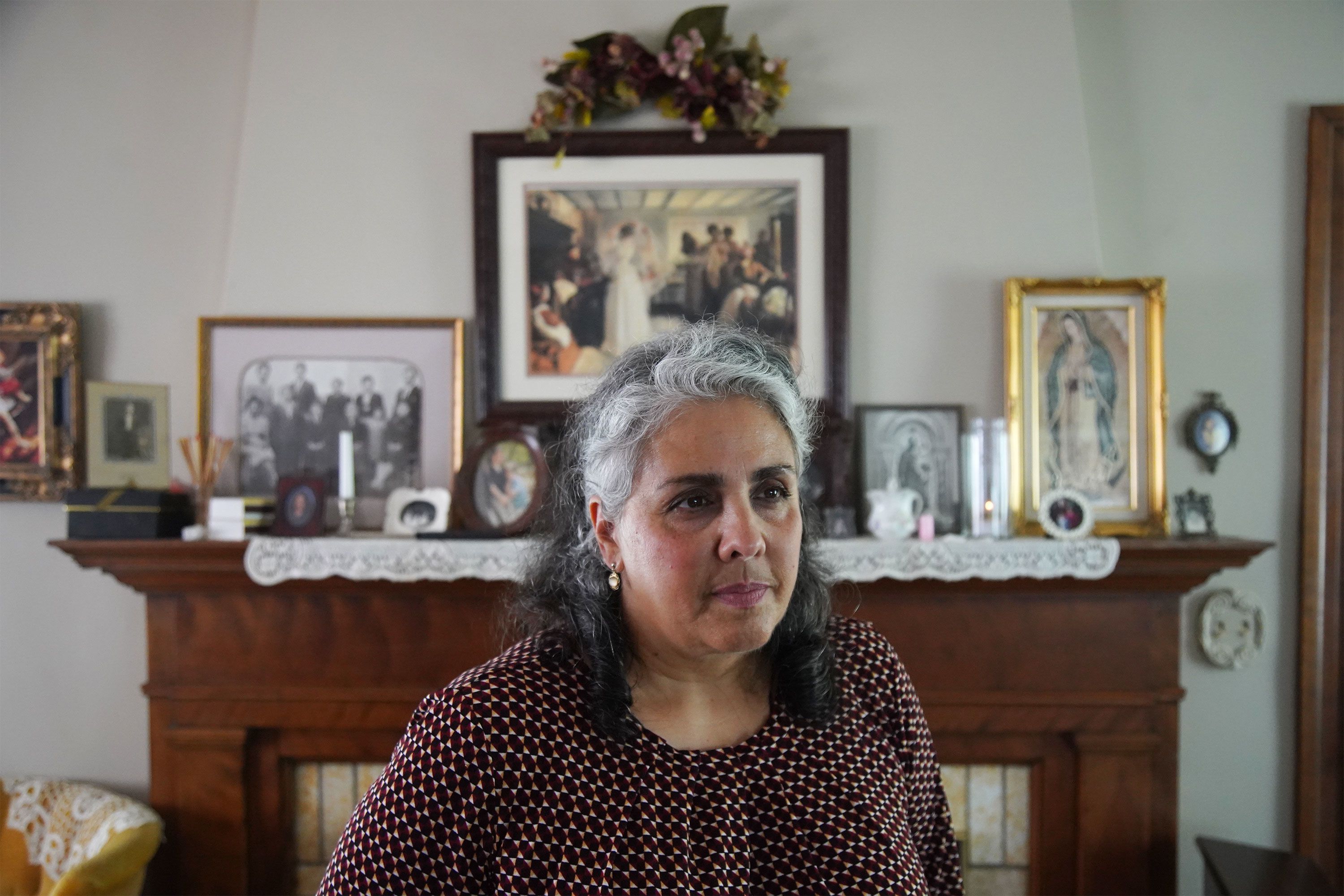
Photo by Ryan Loew / Ideastream Public Media
Photo by Ryan Loew / Ideastream Public Media
Rita Vitale, the abortion opponent who has demonstrated outside Burkons’ clinic for seven years, contemplates what victory will feel like.
“You want to know what I'm going to do if that clinic closes and abortion is illegal from conception?” she said. “It’s going to be exciting, for sure. The Lord will have something for me to do, always. We are essentially trying to change the culture of death to the culture of life.”
The Rev. Terry Williams, the Appalachian pastor and reproductive justice advocate, sees no reconciliation in defeat.
“The hope for common ground is not going to happen for a long, long while,” said Williams. “Folk who have been the silent majority are mad as hell, and we’re not going to take it anymore.”
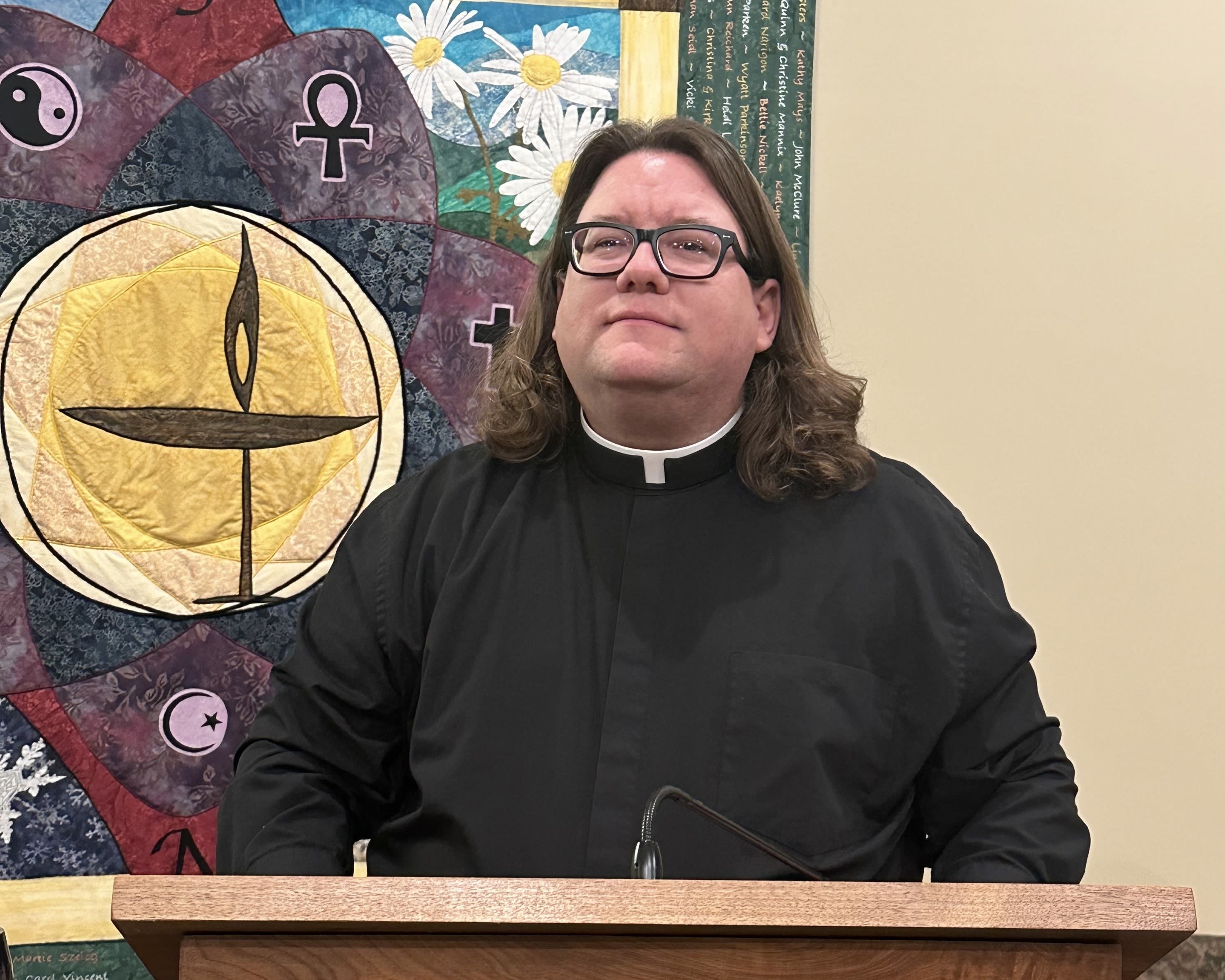
Photo by Rev. Kellie Kelly
Photo by Rev. Kellie Kelly

Photo by Amy Eddings / Ideastream Public Media
Photo by Amy Eddings / Ideastream Public Media
Mike Gonidakis, of Ohio Right to Life, sees the uncertainty, the anxiety, the fear and the anticipation as part of the process of a new landscape coming into view.
“You know, the claims that the sky is going to fall or the sun won't rise or set have found to be not true,” he said. “We are living in a heartbeat world now.”

